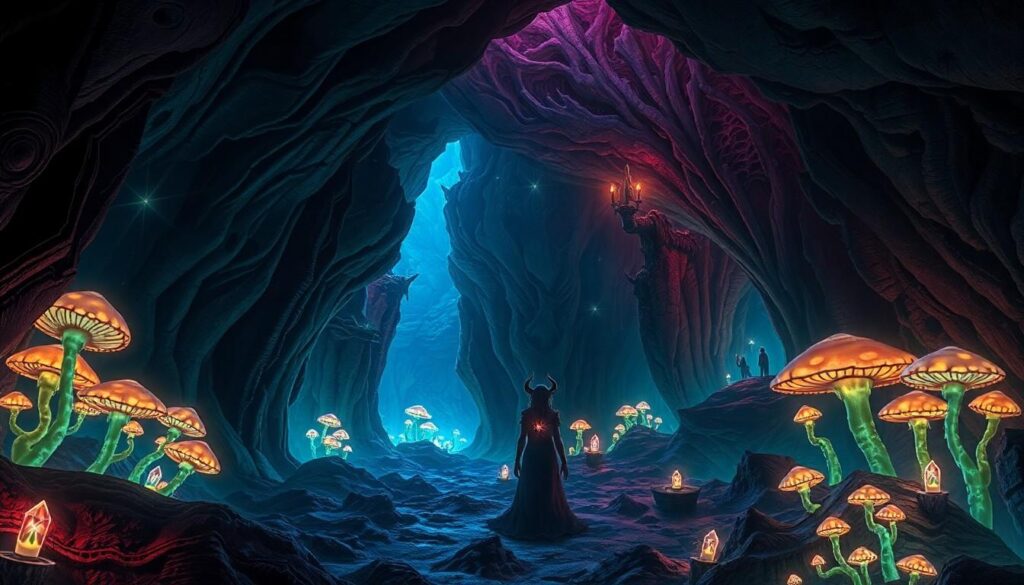Drow names carry a sense of mystery and power that instantly transports us to the shadowy depths of the Underdark. These names aren’t just labels—they’re woven with rich history and secret meanings that help define a character’s place in the industry. Whether we’re building a new Dungeons & Dragons character or searching for the perfect name for our next fantasy story, understanding the significance behind drow names adds depth and intrigue.
We all want our characters to stand out and feel authentic. By exploring the origins and meanings of drow names, we unlock a treasure trove of inspiration that can set our creations apart. Let’s jump into the intriguing area of drow naming traditions and discover how the right name can make our characters unforgettable.
Understanding Drow Names And Meanings
Let’s break down how drow names and their hidden meanings shape the culture and personality of these legendary characters. We always see that drow names come from a mix of ancient words, family ties, and secret traditions unique to their society. Some names reflect status or achievements, while others signal allegiance to powerful houses or deities. Every time we select or create a drow name, we need to think about how language, history, and social structure interact in drow communities.
Choosing the right name for a drow character involves digging into their backstory and clan origin. We can notice patterns in established drow names such as multiple syllables, the use of exotic letters like “z,” “x,” and double vowels, as well as gender-exact endings—examples like “Drizzt” or “Vierna” show these trends. Each syllable often carries hidden meanings tied to virtues, ambitions, or dark secrets, which we can use to enrich a character’s depth.
Creating an authentic drow name means understanding that surface elegance often conceals complexity and intent. We consider every fragment, weaving in elements like family rank, house history, or personal traits. It helps that drow society places huge importance on names; powerful matriarchs and cunning nobles often select or even change names to reflect changing fortunes or alliances.
Roleplayers and writers who want their drow characters to stand out should remember these deeply woven meanings. By paying careful attention to the origins, structure, and secret nuances of each name, we breathe life into unforgettable drow personas that fit seamlessly into any fantasy industry.
Exploring The Origins Of Drow Names

Understanding the origins of drow names lets us appreciate just how much storytelling is laced into every syllable. Within Dungeons & Dragons, these names aren’t just randomly crafted—they’re loaded with heritage, culture, and a good bit of mystery.
Influence Of Drow Culture On Naming Conventions
We’re drawn to the way drow society shapes the names they use. Matriarchal traditions dominate their culture, so female drow names always manage to sound both elegant and commanding—think names that instantly signal leadership. Houses in drow society use their names to show lineage and alliances; a name signals who we serve and where our loyalties lie. Suffixes act as subtle clues: for instance, endings like bryn or lyn often point out assassins or agents, while driira or driirn connect to respected roles like mothers or teachers. Anytime a drow cleric pledges to a new deity, we’re likely to see a complete name change as a show of dedication. Spiritual ties, power structures, and skills all mingle in the naming process, making every drow name a small story.
Historical Roots In Drow Language
We’ve noticed that drow names have a unique, almost melodic harshness when compared to other elves. Looking closely at the etymology, words such as Akor or Alak translate to beloved or best, showing how meanings get tucked into names. A name’s prefix or suffix tells us about status and purpose in society. For example, a cice or roos ending means someone is young or newly born, while dra or zar connotes romantic partnership. Noble drow families keep their legacy alive through special surnames that shout out their guild or house affiliations. Every letter, every syllable is chosen deliberately—a tradition sparked by a language designed to mark out the dark elves as different from their surface kin. These structures are more than linguistic quirks; they serve as living records of status, family, and social ties.
Identifying Common Drow Name Structures

When we look at drow names, unique elements jump out right away. Our experience tells us that every part of their names ties back to the figures, houses, and matrilineal roots that form drow society.
Syllable Patterns And Pronunciation
Names in drow culture favor a sharp yet lyrical flow. Strong consonants pair with pointed vowels to create a sound that’s both elegant and aggressive—names like “Imrae” or “Briza” show off this dual nature. We find that, while these names sound harsher than high elven names, they roll off the tongue just as smoothly when spoken aloud. Each syllable carries weight, and it’s common to find two or three syllables built from a prefix and a meaningful suffix. For example, combinations can transform simple roots into names that hint at qualities such as peerlessness or elemental ties.
Gender Differences In Drow Names
Distinct rules shape how male and female drow names are formed. It’s easy to spot the matronymic tradition in male names—most include the element “kulg” to mark the mother’s lineage. We notice female names usually skip this feature and often end with suffixes that signal their place at the center of drow social structures. Some suffixes show up only in male or female names, which immediately helps to distinguish gender in writing or play. Emphasizing the matrilineal focus, female names end up carrying more cultural weight since inheritance and authority trace through mothers, while male names point to their connections rather than their own standing.
Analyzing Popular Male Drow Names And Their Meanings

We find that every male Drow name carries a unique weight, blending deep cultural roots with layers of personal significance. Let’s break down some classic male Drow names and uncover the symbols woven into their meanings.
Classic Examples Of Male Drow Names
Consider “Eragiin,” a name meaning “Strange one,” perfectly suited for characters who don’t quite fit the usual mold. “Erth” stands for “Resolute,” showing unwavering determination, which we often see in Drow leaders and tacticians. Naming a character “Filkah” brings out the “Pale beauty” imagery—ideal for mysterious, striking individuals. “Gel,” known as “The ambitious one,” reflects Drow striving for power within their society. We think of “Ghol” as “Resourceful,” which fits crafty survivors in the Underdark. “Ghor” means “The calm one,” often describing wise advisors or patient strategists. “Gul” holds the meaning “Spectral,” suited to those with a ghostly presence or skills in stealth. “Harnar” translates as “The first ghost,” tying into ancient legacies or pioneers among the Drow. We attribute “Imrae” with “Mighty strength,” ideal for warriors or defenders. Finally, “Jaezrar” means “The alluring seeker,” a name for clever explorers and knowledge hunters.
| Name | Meaning |
|---|---|
| Eragiin | Strange one |
| Erth | Resolute |
| Filkah | Pale beauty |
| Gel | The ambitious one |
| Ghol | Resourceful |
| Ghor | The calm one |
| Gul | Spectral |
| Harnar | The first ghost |
| Imrae | Mighty strength |
| Jaezrar | The alluring seeker |
Symbolic Significance And Interpretations
Names in Drow culture always tell us more than just who someone is: they share family, tradition, and status. We notice that the matrilineal structure stands at the heart of naming, with suffixes like “kulg” signaling a male child’s lesser societal standing—“Draazoran kulg Yasrena” directly marks him as the second son of Yasrena. Similarly, lineage gets highlighted through “dal,” so “Draazoran dal Yasrena” openly ties him to his maternal house.
Religious pride sometimes shines through names, especially for clerics who honor gods and goddesses, weaving worship into everyday language. Drow names often reflect natural traits too. “Ghol” and “Ghor,” for example, showcase qualities cherished in Drow society—resourcefulness and calm, respectively. Social standing or job roles can be coded into a name, with certain prefixes and suffixes hinting that a Drow is a knight, rogue, or illusionist.
We see that every Drow name, especially for males, isn’t just a label—it becomes a subtle record of kin, status, strength, and ambition in one of fantasy’s most intriguing societies.
Unveiling Popular Female Drow Names And Their Meanings

Let’s jump into the most common female drow names, exploring what each one reveals about its character. Each name we choose reflects a history, a virtue, or an ambition brewed deep within the traditions of drow culture.
Noteworthy Examples Of Female Drow Names
Amalika stands out as it means “peerless,” conveying unmatched skill or beauty. Eragiin translates to “strange one,” showing us a mysterious or unpredictable nature. For those who value inner strength, Erth means “resolute,” describing a woman who never wavers. Filkah refers to “pale beauty,” often chosen for drow whose ethereal appearance astounds others. Gel means “the ambitious one,” so we see this name echo within houses seeking power or influence. Ghol’s meaning is “resourceful,” typically signaling cleverness in handling the politics of the Underdark. Ghor emphasizes calm and composure as “the calm one.” Golgotha calls to mind legacy and dread, being known as “a place of skulls.” Guan, meaning “the accursed drow,” appears in tales of outcasts or exiles. Gul means “spectral,” reminding us of those who move in shadows or work as spies. Harnar refers to “the first ghost,” usually reserved for those who have survived great trials. Hidimba means “powerful devil,” designed for fierce leaders and feared matriarchs. Ilinor calls someone “the obsessed prey,” which hints at relentless determination. Imrae, suggesting “mighty strength,” fits champions and warriors famed for their prowess. Jaezrar translates to “the alluring seeker,” a title for drow whose curiosity shapes destinies.
Traditional Meanings And Lore
Naming in drow culture runs deeper than mere labels; names always carry a story and a signal of influence. Dominance of females shapes both the power and elegance in drow names, elevating them to symbols of respect and authority throughout their society. We frequently hear a harsher sound compared to other elven kin—names are meant to stand apart, marked by assertive consonants and unique syllables. Naming conventions reward awareness: suffixes like bryn or lyn often point to agents or assassins, while diira signals an initiate or close sibling bond. Driira identifies mothers or teachers, and dra or zar alludes to lovers or life-mates. Many drow also inherit surnames from noble family lines or guild affiliations, demonstrating loyalty and the weight of heritage. Cultural significance isn’t just about language—the influence of Lolth, their spider goddess, and their Underdark environment permeates every syllable. Choosing a name means celebrating strength, connection, and the shadowy beauty of the drow industry.
Examining Unique Drow Surnames And Family Names

Let’s look closer at what makes drow surnames and family names so fascinating. Each name gives us clues about family power and hidden ambitions.
The Role Of House Names In Drow Society
Every house name in drow society carries weight, signaling more than just where a person comes from. We often see a matron mother leading her house, and everyone’s status or loyalty is marked by the family name. When we read a name like “d’Quavein” or “Baeqenndar,” we know we’re seeing an echo of matriarchal tradition.
Exact house name elements like “-breena” or “-antar” instantly tell us which clan or ruling line someone claims. We notice that noble houses always have names that set them apart socially, so identifying these names can reveal a character’s spot in the hierarchy. Affiliation with a guild or powerful matron can also show up in a surname, weaving deeper meaning into the web of Underdark intrigue.
Male drow often get names showing their mother’s lineage—matronymic elements like “kulg” mean “snag” and mark a son’s connection to his mother’s house, such as with “Draazoran kulg Yasrena.” Sometimes, a variant like “dal,” meaning “from,” appears, marking family roots and relationships just as strongly.
Meanings Behind Drow Family Names
Every drow family name is a story, revealing culture, power, and sometimes a hint of religious devotion. Matriarchal dominance creates a naming system where female names become more complex and commanding—names like “Amalika” mean “peerless,” while “Chandara” means “the moon,” emphasizing their pivotal role.
Many drow names reflect personal traits or ambitions. “Imrae” means “strength,” giving us a sense of the family’s expectations or reputation. “Jalal” is tied to ideas of power, showing how deeply status and achievement run in drow bloodlines. Clerics in the community sometimes rename themselves to honor their goddess, further blending faith with identity.
Descriptive endings and combinations remind us how names like “-ayne” (maniac) or “-bryn” (assassin) write personality or family trade into every introduction. No detail gets added by chance in drow names; each one shapes the bearer’s place among shadows and rivals.
Deciphering Unisex And Rare Drow Names

Let’s unravel the mystery behind unisex and rare drow names. These names give us new ways to reflect the magic, versatility, and history of drow culture beyond traditional gender lines.
Examples Of Gender-Neutral Drow Names
Some drow names stand apart because they aren’t tied to one gender. We often see names like “Alaun” or “Alton” used for any drow, signaling power and lightning regardless of identity. Others like “Aly” or “Kel” carry meanings such as legendary, singing, or song, and these work for everyone in the community. Many families love names with the suffix “cyrl” or “axle” which mean ally, companion, or friend. We’ll find drow using combinations like “Zynaxle” to represent friendship and unity over division. Using versatile elements ensures these names resonate with any drow, making them both inclusive and meaningful.
Origins And Rarity In Drow Culture
When we look closer, rare drow names typically have unique origins tied to legend or divine inspiration. Sometimes a rare suffix like “dra” or “zar,” meaning lover, match, or mate, pops up—these elements are special markers of connection or romance within the society. In most cases, names like these emerge in certain contexts such as honoring a deity or commemorating an epic event, which explains why they remain uncommon. Certain families prefer to use “dal” meaning “from” to indicate noble origins without the pejorative tone of “kulg.” The less frequent a name appears, the more value it holds among the drow, as rarity often means there’s a deeper or more important story behind it. We recognize unisex and rare names not just as labels but as keys to understanding status, relationships, and the shifting power within the web of drow society.
Creating Your Own Authentic Drow Name

Let’s get practical about making Drow names that feel right at home in any fantasy industry. When we follow a few simple strategies, crafting names full of meaning and mystique becomes easy.
Tips For Combining Sounds And Meanings
Start by choosing a strong prefix that carries weight, like “Zhilin” or “Imrae.” Follow it up with a suffix that adds flow and nuance; options like “-ara,” “-lin,” or “-rae” work well. Mix and match these for personal names, then pair them with a house name such as “Darksong” or “Xylara,” reflecting noble backgrounds or secretive bloodlines.
Think about the character you’re naming. Names ought to reflect traits like strength, cunning, or leadership. For example, picking “Amalika” for a character who stands apart works because the name itself means “peerless.” Review the definitions behind prefixes and suffixes, using resources or naming tables. That way, combining “khalessev” (trusted) with a melodic start creates something both beautiful and meaningful.
Aim for names that sound harsh and lyrical at the same time. Drow names should roll off the tongue yet hint at something dangerous beneath, unlike the softer tones of surface elves. Try reading names aloud; “Chandara” and “Quenthel” echo both mystery and command, fitting perfectly into a shadowy society.
Avoiding Common Naming Mistakes
Resist using names that sound like those from other fantasy races. We want each Drow name to stand out as authentically Underdark. Avoid common or generic names. Repetition, like making “Liriel” or “Zaknafein” too often, can make your stories feel less unique.
Check the meaning of every name component. Combining random syllables without meaning strips the name of depth and authenticity. Skip names that don’t tell a story. To stay consistent, ensure every name fits typical Drow linguistic patterns, including the right mix of consonants and vowels, as well as gender cues in endings.
Most importantly, keep the cultural context in mind. Drow names carry their attitude, history, and ambition. Let’s make sure what we choose reinforces that powerful legacy every time.
Conclusion
When we choose or create drow names, we’re not just picking a label—we’re weaving a narrative thread that adds depth and intrigue to our characters. Every syllable and suffix carries echoes of drow heritage, ambition, and social ties, making each name a living artifact of their industry.
By embracing the artistry behind drow naming traditions, we unlock new layers of storytelling and bring our fantasy adventures to life. Let’s continue exploring these names to enrich our characters and the worlds they inhabit.
Frequently Asked Questions
What are drow names and why are they important in fantasy settings?
Drow names are unique names used by the dark elves in fantasy worlds like Dungeons & Dragons. They are important because they add depth to characters, indicating their heritage, social status, and personality. Choosing an authentic drow name makes your character more memorable and helps build a believable fantasy world.
How are drow names typically structured?
Drow names often consist of strong consonants and pointed vowels, creating a sharp, lyrical sound. Female names usually have elegant, commanding endings, while male names often indicate maternal lineage. Suffixes and syllables in drow names hold clues about status, family ties, and societal roles.
What influences drow naming traditions?
Drow naming traditions are influenced by their matriarchal society, heritage, and religion. Female names carry cultural weight, symbolizing power and elegance, while male names trace family lines and status. The environment, especially the Underdark, and devotions to deities like Lolth, also shape their naming practices.
Do drow names have hidden meanings?
Yes, every drow name is carefully chosen to convey virtues, ambitions, or family connections. Syllables and suffixes often signal a character’s strengths, allegiance, or social standing. Some names even reference ancient legends, religious pride, or natural traits admired in drow society.
What is the difference between male and female drow names?
Female drow names are often longer, end with specific suffixes, and signify leadership or family power. Male names typically denote maternal lineage and are shorter, with endings that reveal their societal role. This difference highlights the matriarchal structure of drow culture.
Are there gender-neutral or unisex drow names?
Yes, drow culture also includes unisex names, such as “Alaun” or “Alton.” These names reflect qualities like unity or magic and may be used by any gender. Rare names often have legendary or divine origins and reveal unique stories or shifting power within drow society.
How do you create an authentic drow name?
Start by combining strong prefixes and suffixes that relate to your character’s traits or background. Use exotic letters and pay attention to established name patterns. Consider the character’s societal role, heritage, and the cultural context to ensure the name feels authentic and meaningful.
What makes drow names different from other fantasy elf names?
Drow names are typically harsher and more melodious than other elf names, with strong consonants and striking vowels. Their structure and chosen syllables reflect the drow’s complex culture, matrilineal traditions, and the influences of their unique environment and religious beliefs.
Why do drow names matter for character creation in games like D&D?
Drow names add authenticity, depth, and memorability to characters. They instantly communicate background, family ties, and social status, making your character feel like a real part of the fantasy world. Using proper drow naming conventions can enhance immersion for both players and storytellers.
Can drow names be used outside of D&D and similar games?
Absolutely! Drow names inspire creativity in any fantasy narrative or world-building project. Their rich meanings and connections to culture and history can add depth to novels, role-playing games, world-building exercises, or even creative writing challenges.







